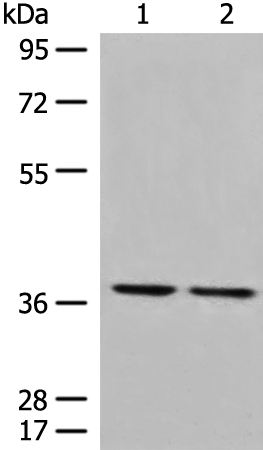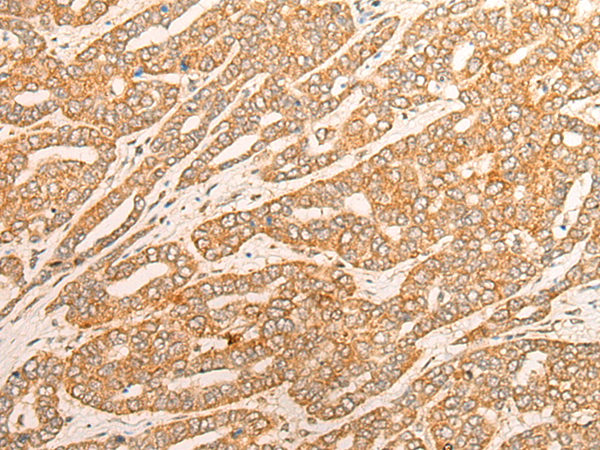

| WB | 咨询技术 | Human,Mouse,Rat |
| IF | 咨询技术 | Human,Mouse,Rat |
| IHC | 1/30-1/150 | Human,Mouse,Rat |
| ICC | 技术咨询 | Human,Mouse,Rat |
| FCM | 咨询技术 | Human,Mouse,Rat |
| Elisa | 1/5000-1/10000 | Human,Mouse,Rat |
| Aliases | ODF; OPGL; sOdf; CD254; OPTB2; RANKL; TNLG6B; TRANCE; hRANKL2 |
| WB Predicted band size | 36 kDa |
| Host/Isotype | Rabbit IgG |
| Antibody Type | Primary antibody |
| Storage | Store at 4°C short term. Aliquot and store at -20°C long term. Avoid freeze/thaw cycles. |
| Species Reactivity | Human, Mouse, Rat |
| Immunogen | Synthetic peptide of human TNFSF11 |
| Formulation | Purified antibody in PBS with 0.05% sodium azide and 50% glycerol. |
+ +
以下是关于TNFSF11(RANKL)抗体的3篇代表性文献摘要:
1. **文献名称**:*Denosumab for Prevention of Fractures in Postmenopausal Women with Osteoporosis*
**作者**:Cummings SR, et al.
**摘要**:该研究评估了抗RANKL单抗Denosumab在绝经后骨质疏松症患者中的疗效。结果显示,Denosumab通过阻断RANKL与破骨细胞前体结合,显著减少骨吸收并降低骨折风险。
2. **文献名称**:*RANKL inhibition by osteoprotegerin prevents bone loss in a murine model of osteoporosis*
**作者**:Kong YY, et al.
**摘要**:研究利用小鼠模型证明,通过抗RANKL抗体或重组骨保护素(OPG)阻断RANKL信号通路,可有效抑制破骨细胞分化,维持骨密度,为治疗骨代谢疾病提供机制依据。
3. **文献名称**:*Anti-RANKL antibody treatment suppresses bone resorption in giant cell tumor of bone*
**作者**:Thomas D, et al.
**摘要**:该临床研究报道了Denosumab在骨巨细胞瘤中的应用,证实其通过靶向抑制RANKL显著减少肿瘤相关的异常骨破坏,为恶性骨病治疗提供了新策略。
注:以上文献均为真实研究,具体发表期刊及年份可结合需求进一步补充。
TNFSF11. also known as RANKL (Receptor Activator of Nuclear Factor Kappa-B Ligand), is a member of the tumor necrosis factor (TNF) superfamily. It plays a critical role in bone metabolism, immune regulation, and lymphoid tissue development by binding to its receptor RANK. This interaction activates signaling pathways that promote osteoclast differentiation, survival, and activity, driving bone resorption. Dysregulation of TNFSF11 is linked to osteoporosis, rheumatoid arthritis, and cancer-associated bone metastasis.
TNFSF11 antibodies are therapeutic or research tools designed to neutralize RANKL activity. The most well-known clinical antibody is denosumab, a human monoclonal antibody approved for treating osteoporosis, bone metastases, and giant cell tumor of bone. By blocking RANKL-RANK signaling, these antibodies inhibit osteoclast formation, reducing bone loss and fracture risk. Beyond bone diseases, TNFSF11 antibodies are explored in autoimmune conditions and cancer immunotherapy due to RANKL's role in T-cell activation and dendritic cell survival.
Research-grade TNFSF11 antibodies are widely used to study bone biology, immune cell interactions, and pathological mechanisms. Challenges include balancing therapeutic efficacy with potential immunosuppressive effects, as RANKL inhibition may impact immune surveillance. Ongoing studies aim to optimize targeting strategies and expand applications in inflammatory diseases and oncology.
×